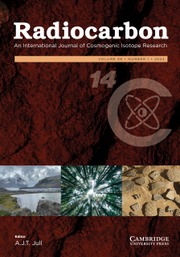Crossref Citations
This article has been cited by the following publications. This list is generated based on data provided by
Crossref.
Napolitano, Matthew F.
DiNapoli, Robert J.
Stone, Jessica H.
Levin, Maureece J.
Jew, Nicholas P.
Lane, Brian G.
O’Connor, John T.
and
Fitzpatrick, Scott M.
2019.
Reevaluating human colonization of the Caribbean using chronometric hygiene and Bayesian modeling.
Science Advances,
Vol. 5,
Issue. 12,
Hopkins, Jenni L.
Lowe, David J.
and
Horrocks, Joanna L.
2021.
Tephrochronology in Aotearoa New Zealand.
New Zealand Journal of Geology and Geophysics,
Vol. 64,
Issue. 2-3,
p.
153.
Sanchez, Gabriel M.
and
Hubbe, Alex
2021.
Reevaluating the antiquity of the Palmrose site: Collections-based research of an early plank house on the northern Oregon Coast.
PLOS ONE,
Vol. 16,
Issue. 8,
p.
e0255223.
Herrando-Pérez, Salvador
2021.
Bone need not remain an elephant in the room for radiocarbon dating.
Royal Society Open Science,
Vol. 8,
Issue. 1,
p.
201351.
Catlin, Kathryn A
2021.
Small Dwelling Sites in the Medieval Settlement of Iceland.
Medieval Archaeology,
Vol. 65,
Issue. 1,
p.
66.
Bunbury, Magdalena M.E.
Petchey, Fiona
and
Bickler, Simon H.
2022.
A new chronology for the Māori settlement of Aotearoa (NZ) and the potential role of climate change in demographic developments.
Proceedings of the National Academy of Sciences,
Vol. 119,
Issue. 46,
Bunbury, Magdalena Maria Elisabeth
Austvoll, Knut Ivar
Jørgensen, Erlend Kirkeng
Nielsen, Svein Vatsvåg
Kneisel, Jutta
and
Weinelt, Mara
2023.
Understanding climate resilience in Scandinavia during the Neolithic and Early Bronze Age.
Quaternary Science Reviews,
Vol. 322,
Issue. ,
p.
108391.
Kleijne, J.P.
and
Huisman, D.J.
2023.
The times they are a-changing. Reconsidering the occupation history and character of a 3rd millennium BCE settlement in the Lower Rhine Area.
Journal of Archaeological Science: Reports,
Vol. 49,
Issue. ,
p.
103982.
Rosencrance, Richard L.
McDonough, Katelyn N.
Smith, Geoffrey M.
Jazwa, Christopher S.
Duke, Daron G.
Jenkins, Dennis L.
Clements, Joshua
Stueber, Daniel O.
and
Suzann Henrikson, L.
2024.
Bayesian Analysis of Haskett Projectile Point Radiocarbon Dates in the Intermountain West Demonstrates Contemporaneity with Clovis and Folsom Points.
PaleoAmerica,
Vol. 10,
Issue. 2-3,
p.
132.
Radde, Hugh D.
Teeter, Wendy G.
Martinez, Desireé R.
and
Kennedy-Richardson, Karimah O.
2024.
A critical evaluation of radiocarbon dates and Indigenous settlement patterns on Santa Catalina Island, California.
The Journal of Island and Coastal Archaeology,
p.
1.
Pluckhahn, Thomas J.
Rogers, Jaime A.
Hadden, Carla S.
Jackson, Kendal
Thompson, Victor D.
and
Garland, Carey J.
2024.
The potentials and limitations of two taxa of terrestrial snails (polygyra spp. And euglandina rosea) as a source material for the radiocarbon dating of indigenous shell mounds and middens in florida, usa.
Journal of Archaeological Science: Reports,
Vol. 57,
Issue. ,
p.
104680.
Kidder, Tristram R.
and
Grooms, Seth B.
2024.
Chronological Hygiene and Bayesian Modeling of Poverty Point Sites in the Lower Mississippi Valley, circa 4200 to 3200 cal BP.
American Antiquity,
Vol. 89,
Issue. 1,
p.
98.
Santana, Jonathan
del Pino, Miguel
Morales, Jacob
Fregel, Rosa
Hagenblad, Jenny
Morquecho, Aarón
Brito-Mayor, Aitor
Henríquez, Pedro
Jiménez, Jared
Serrano, Javier G.
Sánchez-Cañadillas, Elías
Ordóñez, Alejandra C.
and
Gilson, Simon-Pierre
2024.
The chronology of the human colonization of the Canary Islands.
Proceedings of the National Academy of Sciences,
Vol. 121,
Issue. 28,
Herrando-Pérez, Salvador
and
Saltré, Frédérik
2024.
Estimating extinction time using radiocarbon dates.
Quaternary Geochronology,
Vol. 79,
Issue. ,
p.
101489.
Styková, Barbora
Styk, Matej
Repka, Dominik
Světlík, Ivo
Pachnerová Brabcová, Kateřina
Petrová, Markéta
and
Hajnalová, Mária
2024.
AMS, HISTORICAL, AND ARCHAEOLOGICAL DATING OF OPONICE CASTLE.
Radiocarbon,
Vol. 66,
Issue. 6,
p.
1765.
Campana, Steven E.
Hambrecht, George
Misarti, Nicole
Moshfeka, Habiba
Efird, Mary
Schaal, Sara M.
Ólafsdóttir, Guðbjörg Ásta
Edvardsson, Ragnar
Júlíusson, Árni Daníel
Hjörleifsson, Einar
Feeley, Frank J.
Cesario, Grace
and
Palsdóttir, Lilja Björk
2025.
Mortality drives production dynamics of Atlantic cod through 1100 years of commercial fishing.
Science Advances,
Vol. 11,
Issue. 6,
Bunbury, Magdalena Maria Elisabeth
2025.
Towards Robust Demographic Models: A Systematic Framework to 14C Data Aggregation and Analysis with Lessons from the Southern Levant.
Journal of Open Archaeology Data,
Vol. 13,
Issue. ,


